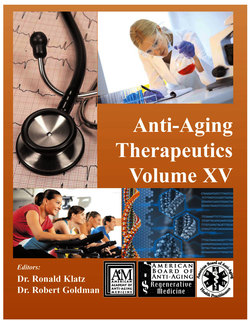Читать книгу Anti-Aging Therapeutics Volume XV - A4M American Academy - Страница 12
На сайте Литреса книга снята с продажи.
Misguided Attacks on HRT
ОглавлениеStatute6 21 U.S.C. § 333(e), a provision of the Food, Drug, and Cosmetic Act (FDCA), supports the use of hormone replacement in mature, clinically GH-deficient adults as both treatment of a disease and a medically authorized use granted by the FDA. Any implication that the statute was intended to target medical hormone replacement by ethical doctors in the new and emerging field of anti-aging medicine is therefore incorrect and misleading.
To obfuscate the truth, critics of the anti-aging medical science offer deliberately misleading claims concerning HRT with the specific and ultimate goal to severely restrict the use of hormone therapy. Most notably, the JAMA commentary4 purported to address the legality of Human Growth Hormone (HGH, GH) treatment by physicians for growth hormone deficient (GHD) patients. The commentary, however, was flawed by a number of incorrect, misplaced references and studies, and multiple basic scientific errors.
In the May-June 2009 issue1 of the prestigious Archives of Gerontology and Geriatrics, an international journal integrating experimental, clinical, and social studies on aging published by Elsevier, founder and Editor-in-Chief Prof. Dr. Imre Zs.-Nagy expresses his opinions on the use of the HGH as an anti-aging medical intervention. Prof. Dr. Nagy’s Editorial points out the main clinical results of HGH replacement therapy (hGHRT) in light of the “Membrane Hypothesis of Aging” (MHA), which he submits as offering a solid basis for the interpretation of the observed beneficial effects of HGH. Prof. Dr. Zs.-Nagy’s profile of the sharp and protracted conflict of views between the gerontological establishment and the A4M exposes a “disregard by certain individuals bearing some of the most prestigious affiliations in the gerontological establishment, for truth, academic integrity, and scientific professionalism.” Dr. Zs.-Nagy submits that: “[T]he gerontological elite has … sought to obfuscate the facts of the anti-aging medical movement. I submit that the reason for this is nothing less than an abject fear by the gerontological elite to avert their loss of control, power, prestige, and position in the multi-billion dollar industry of gerontological medicine. “’
Elite athlete and professional sports/medical writer Monica Mollica observes11 that: “For reasons that are not readily apparent, there appears to be a conservative political movement that opposes the use of testosterone in older men. Continuing, Ms. Mollica observes that: “The political climate is working against testosterone replacement therapy in older men despite overwhelming scientific data supporting this appropriate pursuit as a strategy to prolong healthy longevity.”
`
